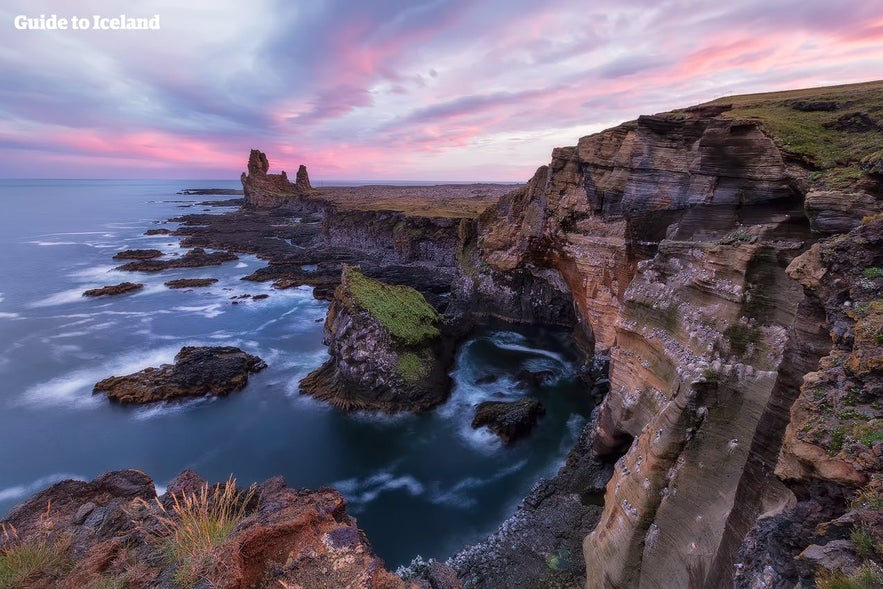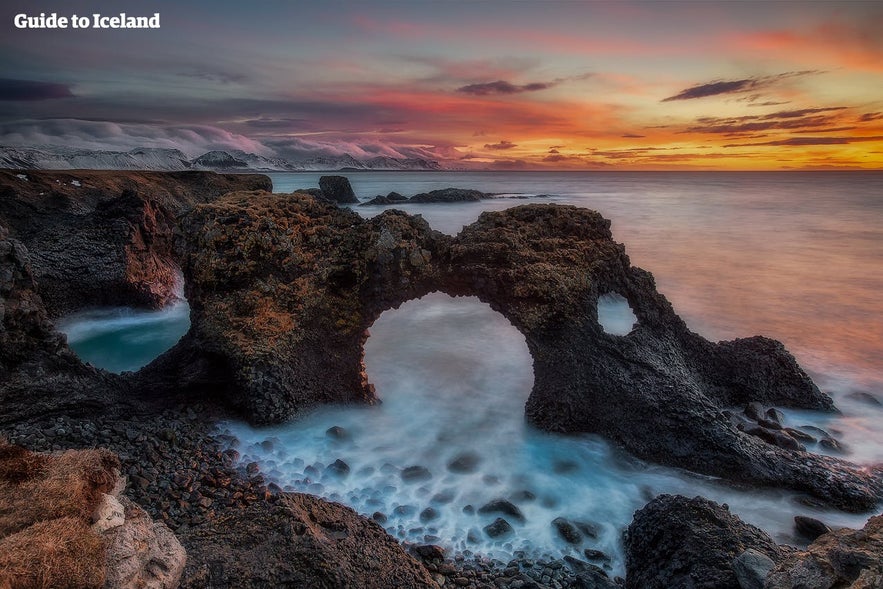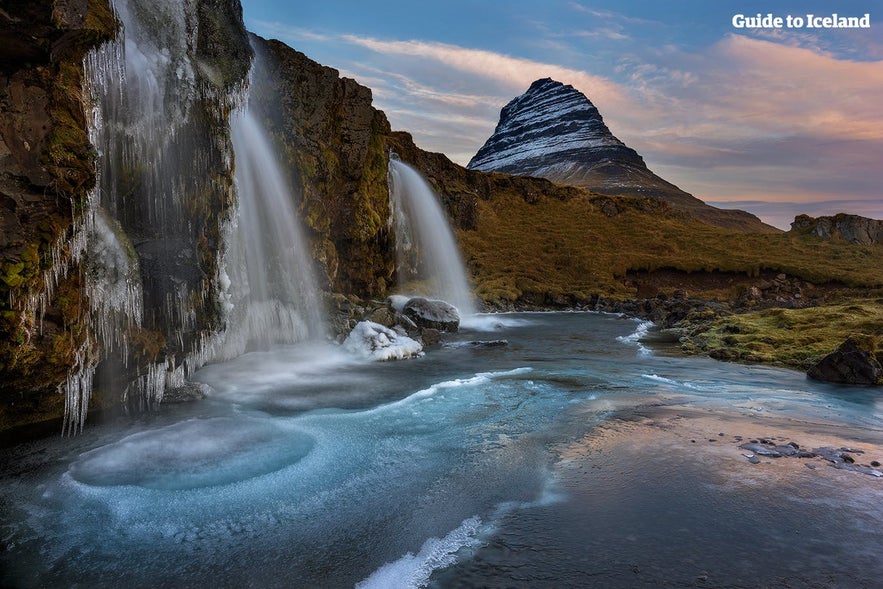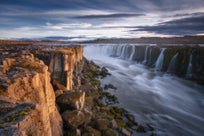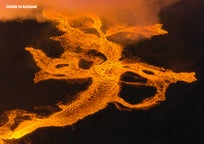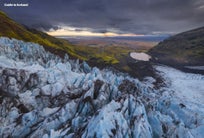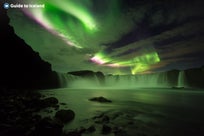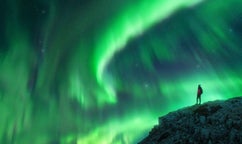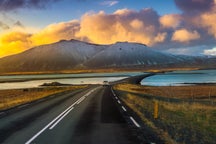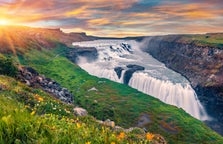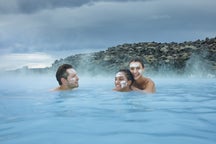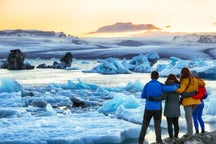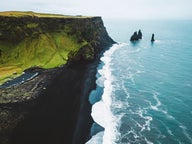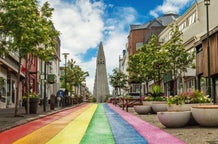
Top 16 Things to Do on the Snaefellsnes Peninsula
- What to Know About the Snaefellsnes Peninsula
- Visiting the Snaefellsnes Peninsula in Summer
- Visiting the Snaefellsnes Peninsula in Winter
- Top 16 Attractions on the Snaefellsnes Peninsula
- 16. Raudfeldsgja Gorge
- 15. Oxl Observation Point and Dreplakolludys Cairn
- 14. Songhellir cave
- 13. Irskrabrunnur & Gufuskalavor Archaeological Site
- 12. Bjarnafoss Waterfall
- 11. Gerduberg Basalt Cliffs
- 10. Eldborg Crater
- 9. Djupalonssandur Black Beach
- 8. Ytri Tunga Beach
- 7. Budir Black Church
- 6. Londrangar Cliffs
- 5. Vatnshellir Cave
- 4. Arnarstapi and Gatklettur Rock
- 3. Ondverdanes and Svortuloft Cliffs
- 2. Snaefellsjokull National Park
- 1. Kirkjufell Mountain
- Top 5 Things to Do on the Snaefellsnes Peninsula
- 5. Explore Flatey Island
- 4. Relax in the Lysulaugar Mineral Algae Baths
- 3. Visit the Bjarnarhofn Shark Museum
- 2. Explore the Snaefellsjokull Glacier
- 1. Puffin Tours and Whale Watching on the Breidafjordur Bay
- Top 5 Towns to Visit on the Snaefellsnes Peninsula
- 5. Hellnar
- 4. Hellissandur
- 3. Grundarfjordur
- 2. Olafsvik
- 1. Stykkisholmur
- Summary of the Top Things to Do on the Snaefellsnes Peninsula

What are the main attractions on Snaefellsnes peninsula? Why is it called "Iceland in Miniature"? Read about this beautiful region in West Iceland, and find out where all the best stops are in and around the Snaefellsjokull National Park.
The Snaefellsnes peninsula in West Iceland features such varied landscapes that it's often called "Iceland in Miniature." It features the stunning Snaefellsjokull glacier volcano, and surrounding it, you'll find vast lava fields, craters, waterfalls, black and white sand beaches, caves, and picturesque mountains. You'll also have gorgeous views along the coastline with rugged rock formations jutting out from the Atlantic waves.
All this is easily explored with a rental car, as the Snaefellsnes peninsula is only a two-hour drive from Reykjavik. There are also many Snaefellsnes tours to choose from that will help you discover the region, either by yourself or during a guided tour.
Simply driving along the peninsula will provide you with stunning views in every direction, but you'll probably want to make a few stops to go out and explore as well. With so much to offer, you can easily spend multiple days discovering the landscapes of the Snaefellsnes peninsula. Luckily, among the many attractions sit calm fishing hamlets, villages, and towns where you can find your perfect accommodation in Iceland.
Whether you're visiting as a day tour from Reykjavik, or are staying multiple days, a visit to the Snaefellsnes peninsula is sure to be a highlight of your trip to Iceland. Plan your perfect travel itinerary with this list of the top things to do on the Snaefellsnes peninsula!
What to Know About the Snaefellsnes Peninsula
Driving around the Sneafellsnes peninsula takes just over two hours, but you will need at least eight hours in total to see the major sights in the region. The main paths to take are roads 54 and 574, which will bring you around the tip of the Snaefellsnes peninsula. Then you will take road 56 to join road 54 again, completing the circle before heading back towards the Ring Road.
If you only have a day to spend on the Snaefellsnes peninsula, it can be very convinient to book a tour. A great option is this small group tour of the whole Snaefellsnes peninsula from Reykjavik. It's an efficient way to see all major sights without the stress of driving, and it's available throughout the whole year. If you're traveling with young children, then this spectacular Snaefellsnes peninsula sightseeing tour is a better option, as it's available for children as young as 2 years old.
- For more: Driving in Iceland: The Ultimate Guide to Road Trips
- See also: How to Drive Safely in Iceland
Visiting the Snaefellsnes Peninsula in Summer
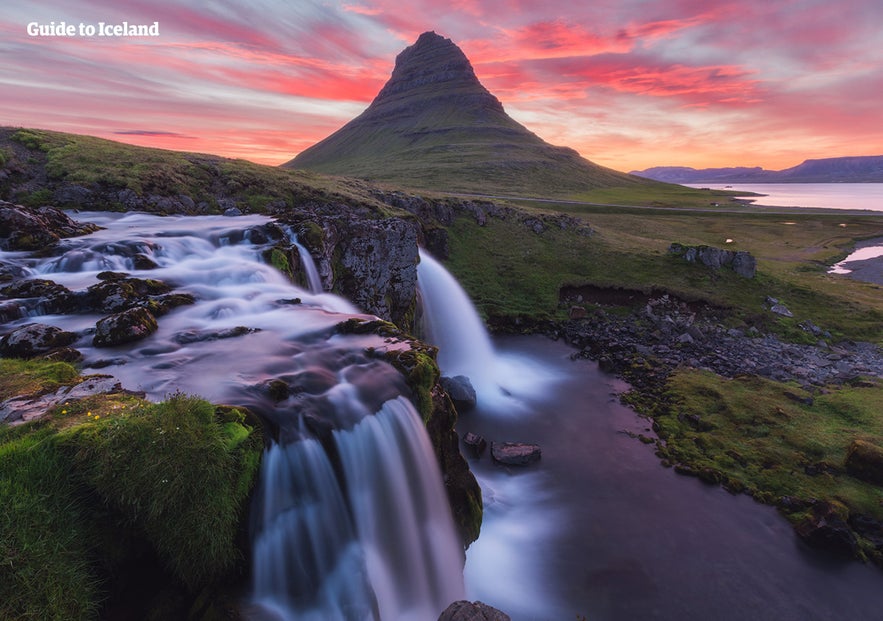
Summer is the best time to visit the Snaefellsnes peninsula as the weather is warmer and the days are much longer because of the midnight sun. This means that you can make the most of your time and include more activities in your travel itinerary. You can also reach most attractions with a small rental car!
The only downside to visiting in summer is that major attractions will be more crowded as it's the high travel season in Iceland. With determination, however, you can still have a peaceful experience. For complete privacy at major attractions, go in the late evening! You'll likely have the place to yourself and still be able to enjoy the benefits of daylight.
This is best if you're staying in accommodation in the Snaefellsnes peninsula so you can easily return to your room for rest instead of driving through the night back to Reykjavik.
Visiting the Snaefellsnes Peninsula in Winter
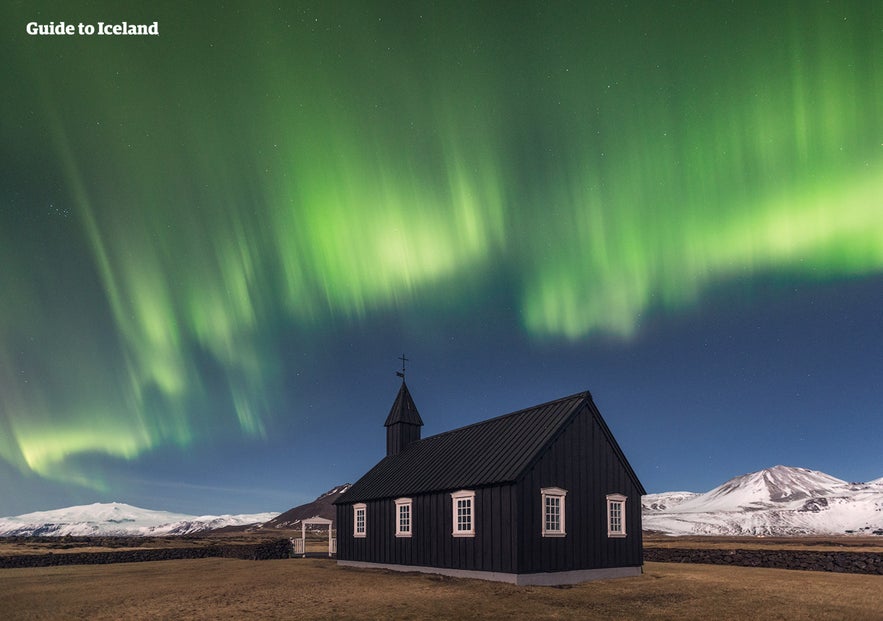
The Snaefellsnes peninsula is generally accessible in winter, though you will need to keep your plans flexible as the Icelandic weather can be unpredictable. There may be ice and snow on the roads, and some mountain roads may close temporarily because of poor conditions. Because of this, it's recommended that you rent a 4x4 vehicle if you plan to drive yourself or simply choose a guided tour for your Snaefellsnes exploration.
Even though driving in the Icelandic winter can be a challenge, there are many worthwhile things to see during the darker months. The mountains will be draped with snow, waterfalls turn into frozen columns, and you may see the northern lights dancing in the sky above the white landscapes!
The Saefellsnes peninsula is a great location for spotting the aurora borealis, as you'll easily find spots secluded from light pollution. You just have to check the aurora forecast and hope for a cloudless sky.
- Read more: Northern Lights in Iceland - When & Where To See the Aurora
- See also: Iceland in Winter - The Ultimate Travel Guide
Top 16 Attractions on the Snaefellsnes Peninsula
16. Raudfeldsgja Gorge
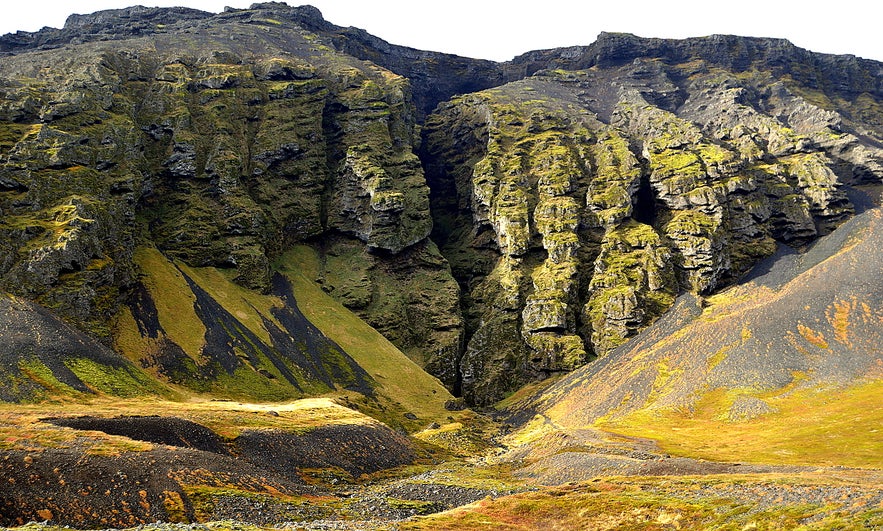
Raudafeldsgja is a beautiful gorge with a small waterfall hidden inside. You can reach it in summer, but it's necessary to climb through the river and up some smaller waterfalls (a rope is provided). You will get wet and cold, so only attempt this if you are wearing warm and waterproof clothes and have dry clothes to change into as soon as you come back.
It's also not necessary to go hiking the whole way to the waterfall, simply go as far as you feel comfortable with and come back! The hike up to the canyon from the parking lot is beautiful, and you'll have stunning views over Faxafloi bay towards Reykjavik as well.
The gorge also has a rich history. It got its name from a character in the Icelandic sagas, Rauðfeldur, and legend has it that he and his brother, Sölvi, were pushed into the ravine by their half-uncle Bárður Snæfellsás, leading to their deaths. This tragic event occurred because the brothers had pushed Bárður's daughter onto an iceberg leading him to believe her dead. In reality, she survived, but her iceberg drifted to Greenland. When she returned home, it was unfortunately too late.
15. Oxl Observation Point and Dreplakolludys Cairn
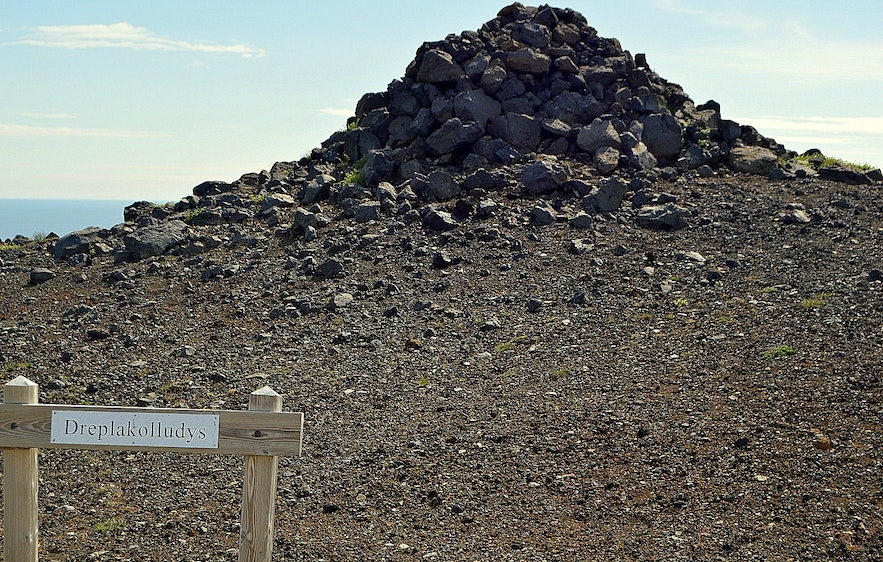
Photo from Regína Hrönn Ragnarsdóttir
If you're interested in learning about the dark history of Iceland, you must include Oxl and the Dreplakolludys cairn on your Snaefellsnes peninsula itinerary.
As you drive along road 574 along the edge of the Snaefellsnes peninsula, you'll pass by a farmstead called Oxl, which sits under the Axlarhyrna mountain. You'll find a great observation point with views of the Snaefellsjokull glacier, but you'll also discover an information sign covering the horrific story of the area.
In the 16th century, the Oxl farmstead was the home of Björn Pétursson, better known as Axlar-Björn, Iceland's only serial killer. Björn preyed on travelers, offering them shelter before taking their lives and disposing of the bodies in the nearby Iglutjorn pond. He was caught in 1596 and sentenced to death. He was charged with the murder of 18 people, though the actual number may well have been higher.
Because of his evil, people were afraid that he would come back from the dead after his execution. He was supposedly tortured and eventually dismembered to prevent this. His body was buried in three different locations on the Snaefellsnes peninsula, and only one of these locations still exists. It's called Dreplakolludys crain, and you can find it close to the village of Hellnar.
14. Songhellir cave
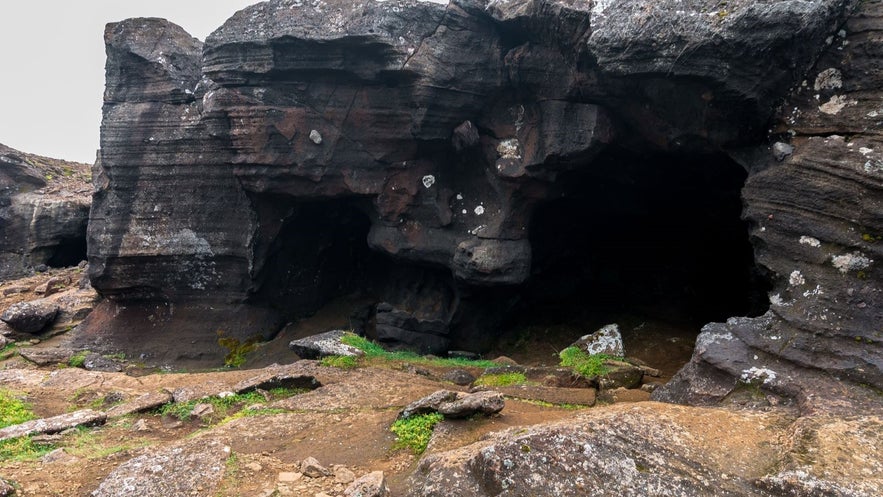 If you have a four-wheel-drive rental car and are exploring Iceland in summer, you can visit the Songhellir cave. Its name translates to "Singing cave," which is appropriate as it's known for its echo and acoustic quality. It's also said to have served as a shelter for Bárður Snæfellsás and his family in the 9th century, the half-man, half-giant who's considered the guardian of the peninsula.
If you have a four-wheel-drive rental car and are exploring Iceland in summer, you can visit the Songhellir cave. Its name translates to "Singing cave," which is appropriate as it's known for its echo and acoustic quality. It's also said to have served as a shelter for Bárður Snæfellsás and his family in the 9th century, the half-man, half-giant who's considered the guardian of the peninsula.
To visit the Songhellir cave, you'll have to take the F570 mountain road. Then, there's only a short walk up to the cave. It's clearly marked, so you shouldn't have trouble finding it. You'll be able to enjoy beautiful views over the surrounding area, and remember to test out the cave's echo!
Additionally, you'll see a lot of carvings inside the cave, including the names of Eggert Ólafsson and Bjarni Palsson. They are believed to be the first people to reach the summit of the Snaefellsjokull glacier in 1754, but they're best known for their book detailing their travels around Iceland between 1752 and 1757.
It's an invaluable source of information about daily life in Iceland during the 18th century, and it's been published in English under the name Travels in Iceland: Performed by Order of His Danish Majesty. It's worth a read if you want to learn about Icelandic history and culture.
13. Irskrabrunnur & Gufuskalavor Archaeological Site
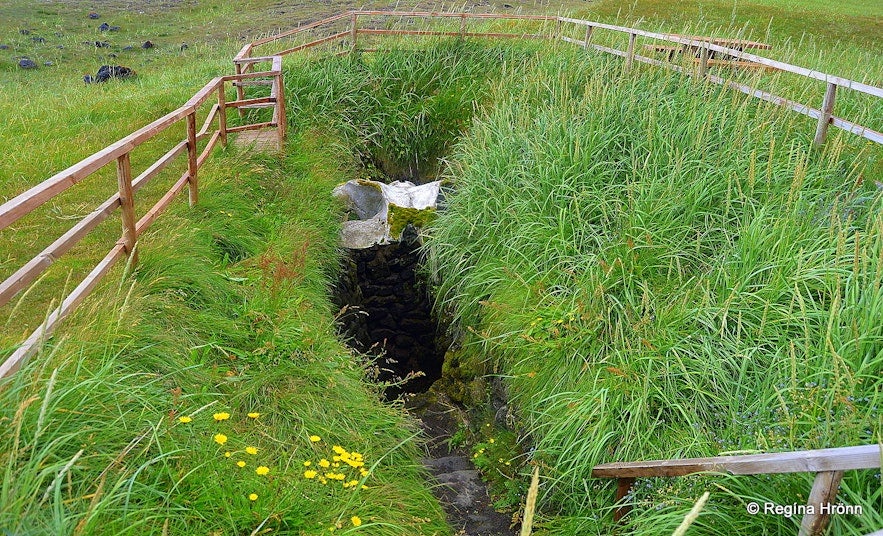
Photo from Regína Hrönn Ragnarsdóttir
One of the more unique locations to visit on the Snaefellsnes peninsula is the Irskrabrunnur and Gufuskalavor archaeological site. It's just by the main road on the tip of the peninsula and is easily accessible.
Irskrabrunnur means "Irish Well," and that's exactly what it is. The well served as a source of drinking water for nearby inhabitants and travelers, but it was lost for a long time as it had been buried by sand. However, stories lived among locals about a grand well in the area, and it was rediscovered in the mid-19th century before being lost again. It was finally formally excavated in 1989.
Today, it has clear markings and has been fenced in for safety. You can walk down the 16 steps to the bottom, though the well has long dried up. You can also see a massive whale bone that hangs above the well's opening.
The Irskrabrunnur name refers to the "papar," Irish monks who supposedly lived in Iceland before the Norse settlement, though this has not been confirmed by archeological evidence. It's more likely that the well is from the Middle Ages, made by sailors from the nearby Gufuskalavor fishing station, but this is still unclear. Nonetheless, the well is a grand construction!
The Gufuskalavor fishing station is worth a stop during your visit, as there are interesting ruins in the area dating back to the 14th and 15th centuries. By the shore, you can even see grooves in the rocks formed by the keels of rowboats.
A few meters away, you can stop by Irskrabyrgi or "the Shelter of the Irish," a stacking of lava rocks likely made to shelter livestock.
12. Bjarnafoss Waterfall
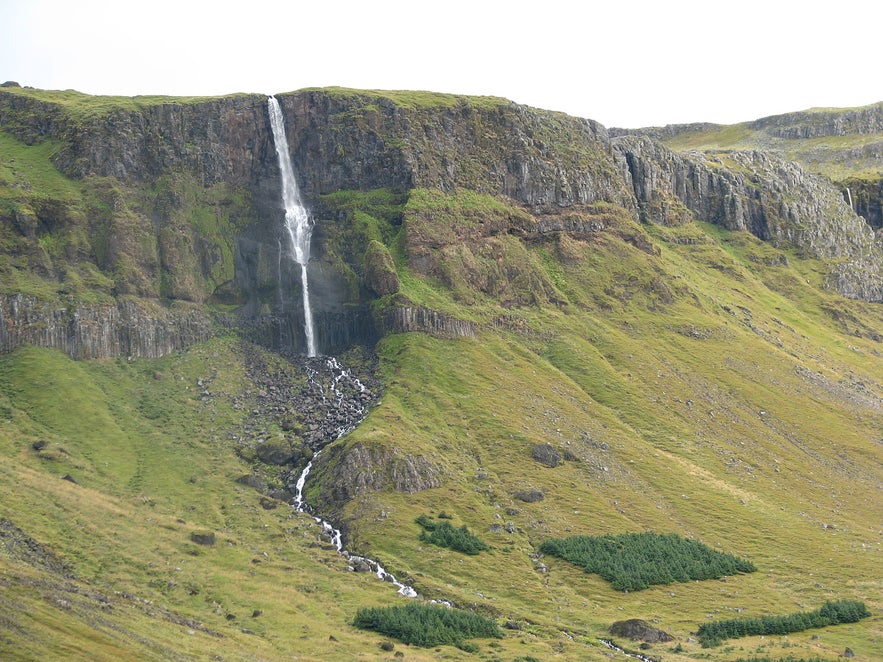 Photo from Wikimedia, Creative Commons, by Bromr
Photo from Wikimedia, Creative Commons, by Bromr
The beautiful Bjarnafoss waterfall cascades down a mountainside on the southern coast of the Snaefellsnes peninsula. When driving along the main road, you will see the watery mist from the waterfall for a long time before it appears.
The Bjarnafoss waterfall is 262 feet (80 meters) tall, and the walk to it is both easy and picturesque, though it can be difficult to go all the way up to it in winter. There is a parking lot and a comfortable resting area close by where you can recharge and admire its beauty, making it a great stop to include in your travels.
The waterfall is also said to hide a treasure. According to legend, a wealthy farmer named Bjarni refused to provide shelter for a passing traveler. The traveler cursed him, causing Bjarni's livestock and crops to die. This led to Bjarni going mad and throwing all of his wealth into the waterfall, which has yet to be found.
11. Gerduberg Basalt Cliffs
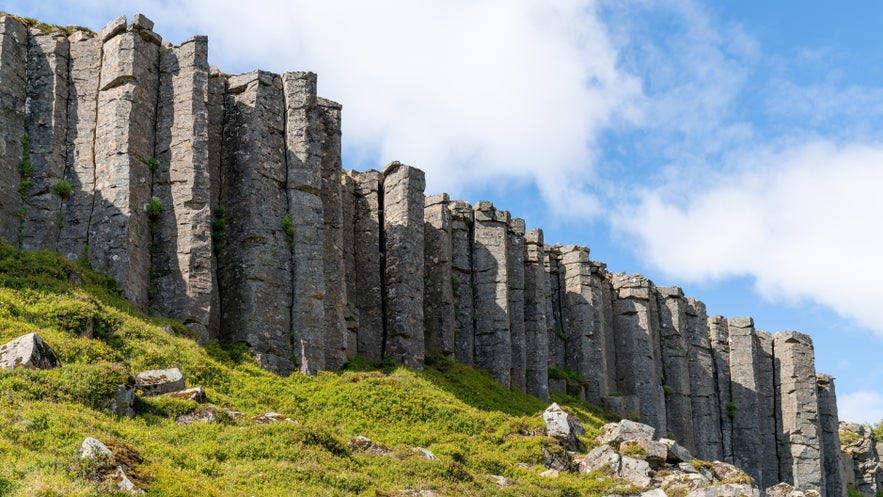
The dramatic Gerduberg cliffs are one of the longest rows of basalt cliffs in Iceland. They formed as a result of volcanic activity and the slow cooling of lava and they run adjacent to the main road for over half a mile (1 kilometer).
These geological formations consist of symmetrical columnar basalt that stands between 23 and 46 feet tall (7 and 14 meters). You can easily access them from the main road. From the parking lot, you can either walk up to the top of the Gerduberg cliffs or to the bottom. The walk is pretty easy, though the last part is very steep.
We recommend taking the time to walk up to them to appreciate their impressive size. It's one of the more beautiful basalt cliffs in Iceland.
10. Eldborg Crater
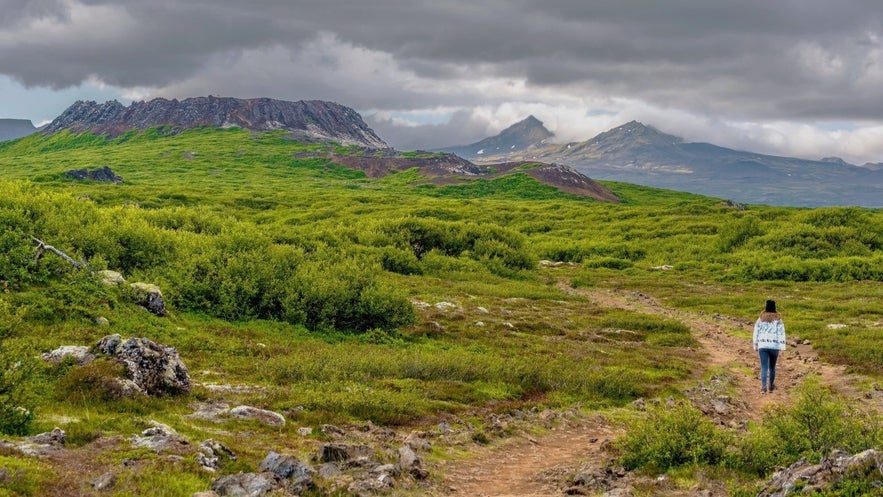 At the base of the Snaefellsnes peninsula, you'll find Eldborg, a round-shaped crater that's 196 feet tall (60 meters) and around 656 feet in diameter (200 meters). It was formed in an eruption 5,000-8,000 years ago, and it makes for a great hike.
At the base of the Snaefellsnes peninsula, you'll find Eldborg, a round-shaped crater that's 196 feet tall (60 meters) and around 656 feet in diameter (200 meters). It was formed in an eruption 5,000-8,000 years ago, and it makes for a great hike.
Hiking to the Eldborg crater can take up to two hours, both ways, depending on how fast you walk and how much you explore. The path is pretty easy, though it's rather rocky, so it's best to bring good shoes. The crater itself features some beautiful lava formations in different colors, so it's well worth taking the time to visit.
9. Djupalonssandur Black Beach
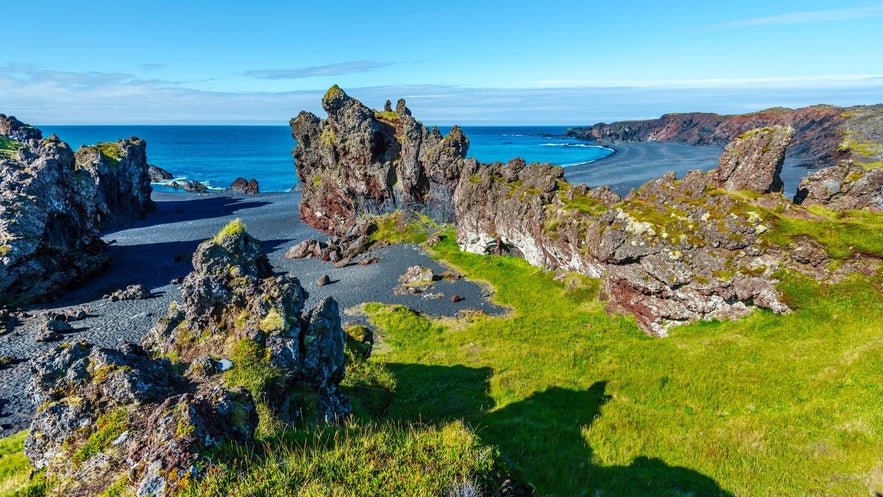 The Reynisfjara black sand beach on Iceland's South Coast may well be the most famous black beach in Iceland, but Djupalonssandur rivals it both in beauty and danger. This gorgeous beach contains both black sand and perfectly round black pebbles shaped by the ocean waves, and it's surrounded by dramatic lava formations.
The Reynisfjara black sand beach on Iceland's South Coast may well be the most famous black beach in Iceland, but Djupalonssandur rivals it both in beauty and danger. This gorgeous beach contains both black sand and perfectly round black pebbles shaped by the ocean waves, and it's surrounded by dramatic lava formations.
The name of the beach means "Deep Lagoon's Sand," as nearby you'll see the gorgeous Djupalon or "Deep Lagoon." Despite the name, the lagoon is merely 5 meters deep, and it's framed by beautiful lava cliffs and the black sand beach.
The beach is also known for its historic lifting stones, which were used to measure the strength of fishermen in the area in the past. Their weight ranges from 55 up to 340 pounds (23 -154 kilos), and you can try your hand at lifting them!
During your visit, you will also come across the ruins of a British trawler, The Epine GY7, which was wrecked east of Dritvik cove on the 13th of March 1948. 14 men died, and 5 were saved by the Icelandic search and rescue teams from neighboring towns. The iron ruins remain as a memoir of the lives lost here, so the ruins should not be taken away.
Like at Reynisfjara, the surf is life-threateningly dangerous for visitors, with sneaker waves appearing out of nowhere and grabbing anyone that doesn't stay a safe distance away.
- See also: Djupalonssandur & Dritvik; The Black Lava Pearl Beach on Snaefellsnes in West Iceland
- See also: Things That Can Kill You in Iceland
8. Ytri Tunga Beach
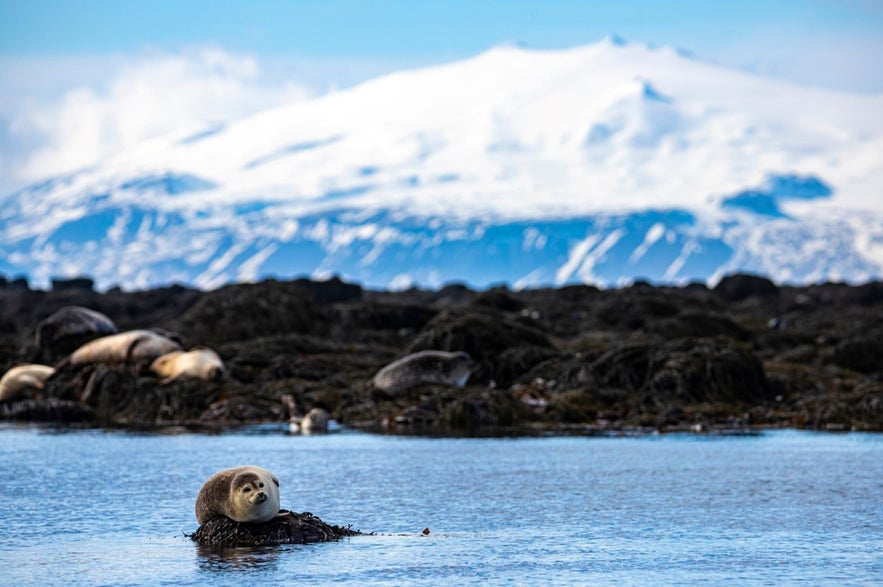 A special stop to include in your Snaefellsnes peninsula itinerary is Ytri Tunga. It's one of the few white-sand beaches in Iceland and a favored spot for those hoping to observe seals in their natural habitat. This sandy and rocky shore is home to a seal colony, where the animals can often be seen lounging or frolicking, particularly during the summer months.
A special stop to include in your Snaefellsnes peninsula itinerary is Ytri Tunga. It's one of the few white-sand beaches in Iceland and a favored spot for those hoping to observe seals in their natural habitat. This sandy and rocky shore is home to a seal colony, where the animals can often be seen lounging or frolicking, particularly during the summer months.
Visitors are advised to maintain a respectful distance and to keep as quiet as possible, ensuring that the seals are not disturbed. The best time for seal spotting in Iceland is in June and July.
- See also: Seal Watching in Iceland
7. Budir Black Church
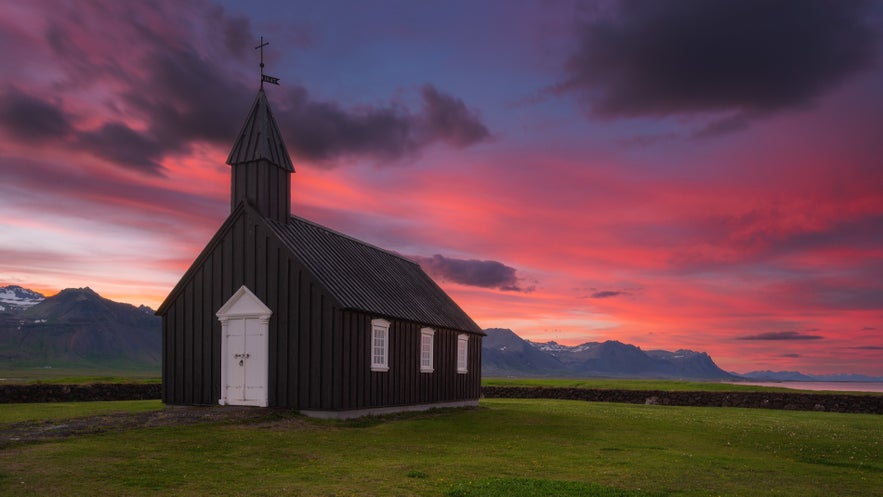
Budir is a small hamlet consisting of a black church and the historic Hotel Budir. The iconic black church and its surroundings make for gorgeous photographs and draw in travelers. It's worth having a stroll in the area, and you can also enjoy a lovely lunch or dinner at the hotel restaurant.
The Budir church was first built in 1703, but it, unfortunately, rotted down. The church was rebuilt In 1848 by Steinunn Sveinsdóttir, a widow who lived in Budir, and it still stands today, although in a different location.
In 1984 it was moved in one piece from its former location by the old graveyard to its current location. Budir church is managed by the local parish.
If you're staying for more than a day in the region, then consider booking a night at Hotel Budir. It's one of the best hotels on the Snaefellsnes peninsula, with an average rating of 4.6 out of 5 stars, and can make for a lovely romantic getaway or a comfortable base for your Snaefellsnes self-drive tour.
- See also: Best Places for Marriage Proposals in Iceland
- For more: The Black Church of Budir as a Photography Location
6. Londrangar Cliffs
The two Londrangar cliffs are found along the seashore of Snaefellsjokull National Park and can be seen from the main road. The cliffs are actually volcanic plugs formed thousands of years ago and were once part of a large crater.
The taller rock is 246 feet tall (75 meters), and the smaller one is 200 feet tall (61 meters), towering over a surrounding lava field. They're impressive from a distance, but you can also walk all the way up to these towering rocks to truly appreciate their height. The hike is just over half a mile (1 kilometer) and takes around an hour.
Birdlife is rich in the area, and the view towards the Snaefellsjokull glacier is stunning.
The cliffs are also surrounded by folklore, as it's said that the smaller one is a troll man. His troll wife is found slightly further along the coastline. Some also believe that the larger cliff is an elf church and the smaller one an elf library.
Both of the pinnacles have been climbed; the taller one was first successfully climbed in 1735, but the smaller one wasn't successfully climbed until 1938. However, we wouldn't recommend trying this as they are very dangerous and should only be attempted by very experienced climbers with proper gear.
- See also: Londrangar and the Elves and much more
5. Vatnshellir Cave
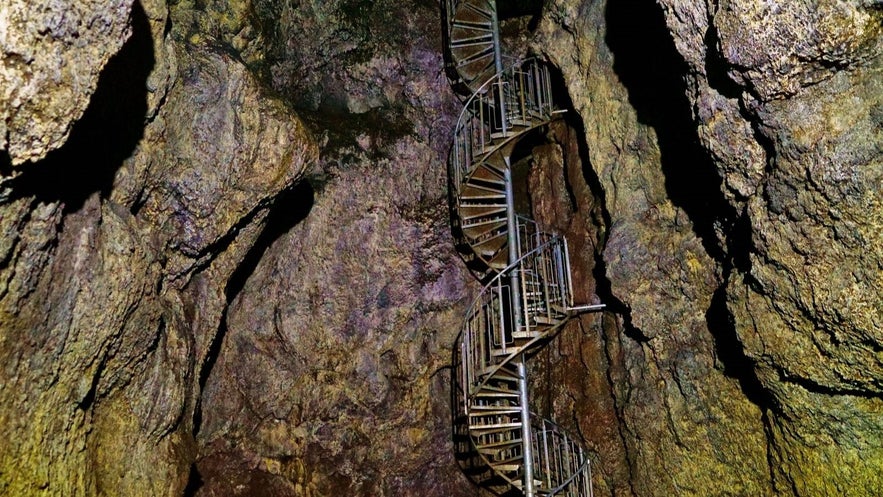 Vatnshellir is an 8000-year-old lava cave that you can access on the Snaefellsnes peninsula. The cave has only been open to the public since the summer of 2011, and it's only accessible with a guide as part of this 50-minute Vatnshellir cave tour.
Vatnshellir is an 8000-year-old lava cave that you can access on the Snaefellsnes peninsula. The cave has only been open to the public since the summer of 2011, and it's only accessible with a guide as part of this 50-minute Vatnshellir cave tour.
To enter the Vatnshellir cave, you descend down a spiral staircase 115 feet (35 meters) into the ground. You will then follow the flow of the ancient lava for about 656 feet (200 meters) and admire the colorful cave walls.
This is not a demanding walk, but you'll need a reasonable fitness level. The surface is a little uneven and sometimes sharp, so make sure you wear good hiking shoes and warm clothing, including gloves. A helmet and a torch are provided in the tour.
4. Arnarstapi and Gatklettur Rock
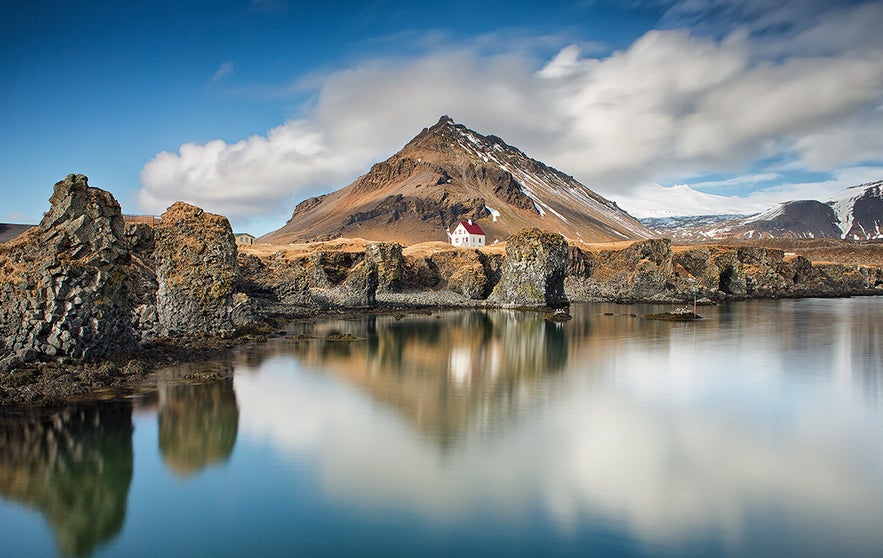
Arnarstapi is a tiny settlement next to the pyramid-shaped mountain Stapafell. Arnarstapi used to be an important trading post with a much larger population. Now it only has very few houses, an information center, and a small pier for small boats, as well as a sculpture of the mythical half-man, half-troll Bárður Snæfellsás by artist Ragnar Kjartansson.
There are also accommodation options in Arnarstapi, which can be convinient if you want to spread your Snaefellsnes peninsula exploration over two or more days.
Arnarstapi is surrounded by a large lava field and has beautiful seaside views along with some interesting rocks along the coastline. A colony of Arctic tern resides in the small hamlet, and a walk along the seashore is recommended to enjoy the lava formations and the rich birdlife.
The most famous rock formation in the area is Gatklettur, or "Hole Rock." The name is obvious as there is a giant hole through the rock, which looks stunning in pictures with the waves crashing through it. It's even more breathtaking in person as you gaze out to sea whilst listening to the waves and stillness surrounding you.
The seaside and the cliffs between Arnarstapi and the nearby hamlet Hellnar were made a Natural Reserve in 1979 and are now a part of Snaefellsjokull National Park. The walk from Arnarstapi to Hellnar is approximately 30 minutes one way and comes highly recommended.
3. Ondverdanes and Svortuloft Cliffs
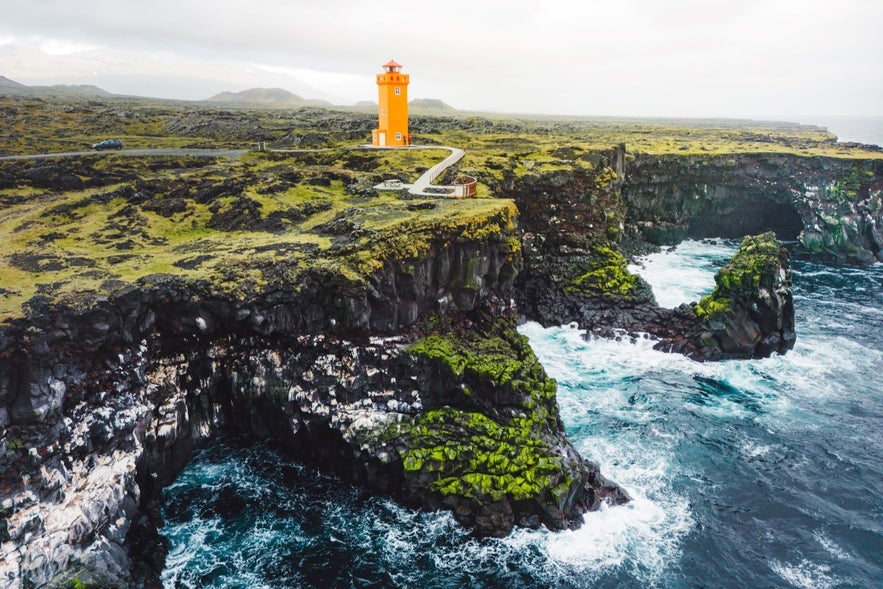
The westernmost point of the Snaefellsnes peninsula is called Ondverdarnes, and it's where you'll find the dramatic Svortuloft cliffs or "Black Ceilings." They are also called Nesbjarg (Peninsula Cliff) and Saxholsbjarg (Knife Hill Cliff), depending on whether you're approaching them from the sea or land.
The cliffs were formed when hot lava erupted from the Snaefellsjokull volcano out to sea, and then the forceful waves of the Atlantic Sea broke off the outer rocks, leaving the vertical cliffs behind. The area is absolutely stunning, especially as it's all contrasted with the orange Skalasnagaviti lighthouse that sits on top of the cliffs.
You'll have to drive for 15-20 minutes along a gravel road to reach this area, and it's best done in summer when the weather is milder. Avoid visiting when there's strong wind for safety.
Usually, you can easily access it with a small rental car, just make sure to drive slowly and carefully, as the road can be a bit rough. Along the way, you can stop in Skardsvik, a lovely white sand beach surrounded by lava rocks. It's also the location of a 10th-century Viking burial mound that was excavated in 1962. You'll find interesting information signs with details about the archeological find, and it's worth a short stop along your way.
You can also do a detour to the tiny orange Ondverdanes lighthouse, which is surrounded by history. It used to be the location of a fishing station, and there are still some archeological remains visible along the coast.
- For more: Ondverdarnes Cape - the Westernmost Point on the Snaefellsnes Peninsula
- See also: The Majestic Skardsvik, Saxholsbjarg & Svortuloft on the Snaefellsnes Peninsula
2. Snaefellsjokull National Park
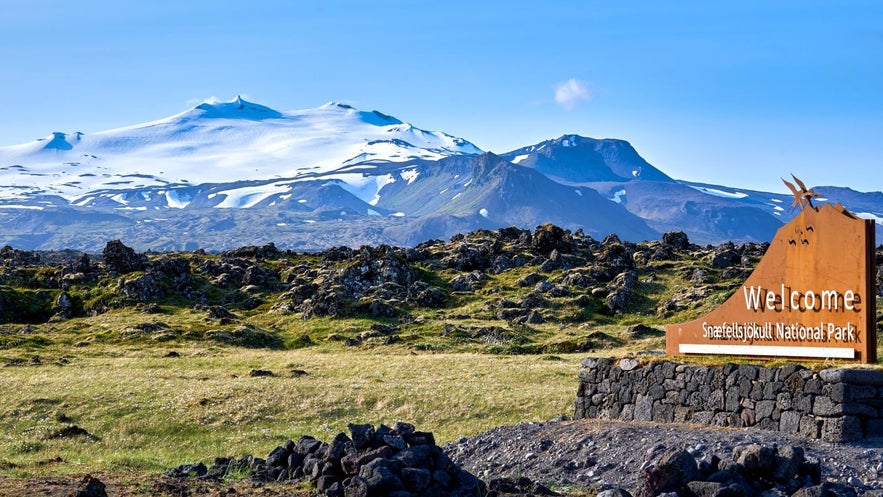 Iceland has three national parks, one of which surrounds the Snaefellsjokull glacier and reaches all the way to the seashore of the Snaefellsnes peninsula. The Snaefellsjokull National Park was established in 2001 and covers 66 square miles (170 square kilometers), and within it are numerous beautiful attractions, including rock formations, lava fields, and volcanic craters.
Iceland has three national parks, one of which surrounds the Snaefellsjokull glacier and reaches all the way to the seashore of the Snaefellsnes peninsula. The Snaefellsjokull National Park was established in 2001 and covers 66 square miles (170 square kilometers), and within it are numerous beautiful attractions, including rock formations, lava fields, and volcanic craters.
If you don't have time to explore all of the Snaefellsnes peninsula, you can narrow your itinerary down to those within the Snaefellsjokull National Park, as many are featured on this list! Additionally, take the time to explore the variety of hiking trails, check out bird colonies along the coastal areas, and enjoy the peacefulness and stark beauty of the Icelandic wilderness.
The main highlight of the park is the Snaefellsjokull glacier. It famously featured as the entrance to the Earth's core in Jules Vernes' sci-fi classic "Journey to the Center of the Earth." It was also the setting for another novel, Kristnihald undir Jökli, or "Under the Glacier" by Icelandic Nobel Prize winner Halldór Laxness.
The Snaefellsjokull glacier is 4744 feet high (1446 meters) and is situated on top of a 700,000-year-old stratovolcano. Currently, the glacier covers around 10km2 but was double that size around the year 1900.
We recommend taking the time to visit Malarrif, the main visitor center for the park, which has an interesting exhibition about the surrounding nature and history of the park. It will make your visit to the region more insightful and enjoyable!
- See also: National Parks in Iceland
- See also: Icelandic Literature for Beginners
1. Kirkjufell Mountain
One of the most iconic attractions in Iceland is the Kirkjufell mountain, found along the Snaefellsnes peninsula coastline. It featured in Game of Thrones as "Arrowhead Mountain," but long before it was included in this world-known TV series, it had been a popular location among photographers and nature enthusiasts.
The mountain is only 1519 feet (463 meters), and from one particular angle, the mountain is triangular shaped, although when looked at from the nearby Grundarfjordur town, it is much wider, with more of a trapezium shape.
It's possible to get some amazing views of the mountain on still days when it's reflected in the calm sea surrounding it, perhaps crusted in ice in winter, or with the sunset reflected in the water.
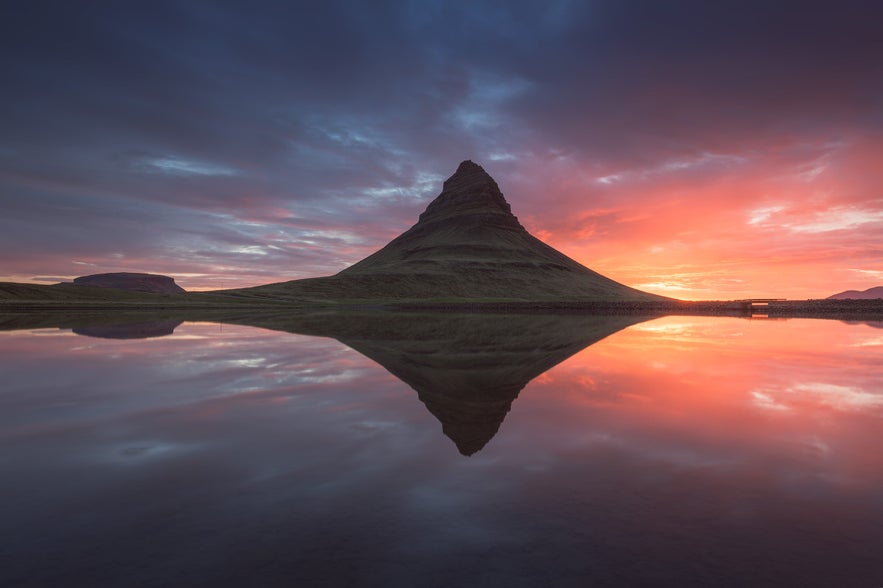 The most popular spot to photograph it from is by the side of the road, where it has its iconic triangular shape and where a small waterfall named Kirkjufellsfoss trickles down the opposite hillside. This waterfall is the perfect foreground, with Kirkjufell casually filling in the backdrop.
The most popular spot to photograph it from is by the side of the road, where it has its iconic triangular shape and where a small waterfall named Kirkjufellsfoss trickles down the opposite hillside. This waterfall is the perfect foreground, with Kirkjufell casually filling in the backdrop.
This location, as well as all other locations on the Snaefellsnes peninsula, is popular all year round, when it's covered with snow and has dancing auroras overhead or when it's covered in green and bathed in light from the midnight sun.
- See also: Movie Locations in Iceland
- For more: Weather in Iceland & Best Time to Visit
Top 5 Things to Do on the Snaefellsnes Peninsula
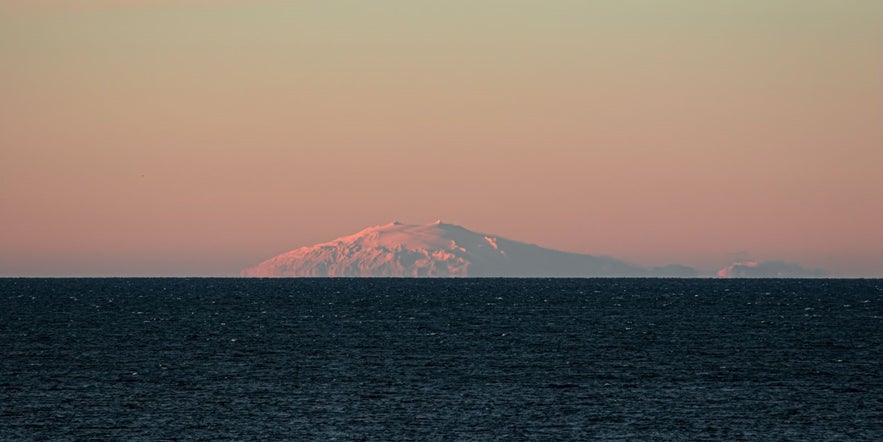 Adding fun activities and experiences to your travel itinerary between visits to iconic locations is a great way to maximize your experience. Here are some of the best things to do on the Snaefellsnes peninsula.
Adding fun activities and experiences to your travel itinerary between visits to iconic locations is a great way to maximize your experience. Here are some of the best things to do on the Snaefellsnes peninsula.
5. Explore Flatey Island
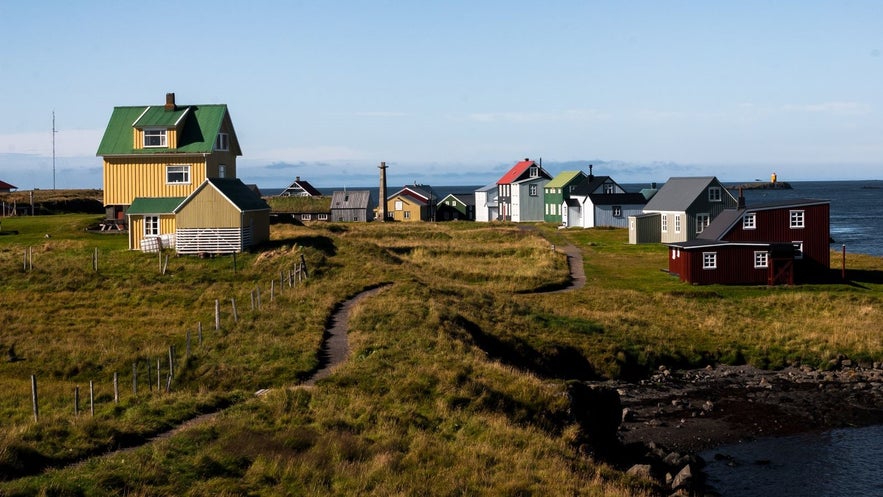 If you're staying multiple days on the Snaefellsnes peninsula in summer, you should consider adding a visit to Flatey island to your itinerary. It's an isolated island in the Breidafjordur bay which has a tiny village that is mostly inhabited during the summer months.
If you're staying multiple days on the Snaefellsnes peninsula in summer, you should consider adding a visit to Flatey island to your itinerary. It's an isolated island in the Breidafjordur bay which has a tiny village that is mostly inhabited during the summer months.
To access Flatey, you have to take the Baldur ferry to the Westfjords, which departs from the charming town of Stykkisholmur. It's worth spending the afternoon walking around the island, seeing the colorful traditional houses, observing the birdlife, and enjoying the tranquility.
The Flateyjarkirkja church is very beautiful, as its ceiling depicts unique scenes from daily life on the island, painted by Baltasar Samper. The altar also depicts a lovely religious scene where Jesus wears an Icelandic Lopapeysa sweater.
You can enjoy a meal at the Hotel Flatey or bring food with you to enjoy among the nature. You can then take the ferry back to Stykkisholmur or continue your journey to the Westfjords.
- For more: A Local's Guide to the Secluded Flatey Island
- See also: 20 Hidden Gems in Iceland
4. Relax in the Lysulaugar Mineral Algae Baths
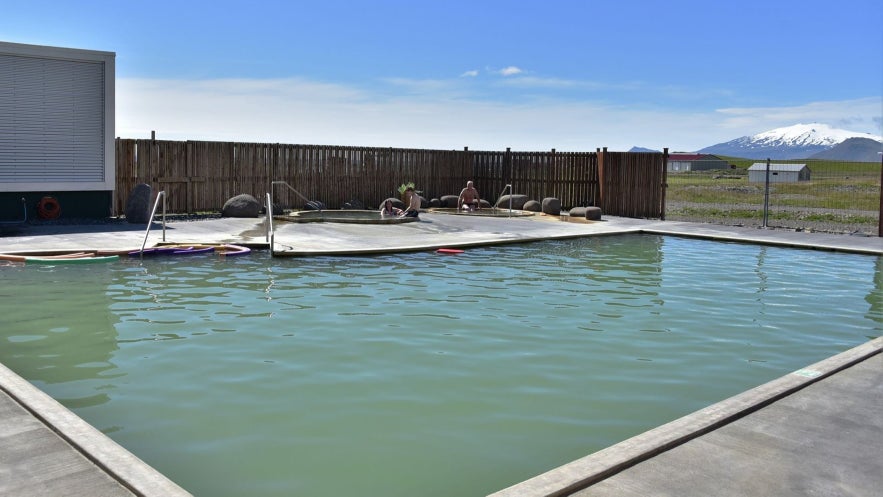
Photo from Lysulaugar
Iceland is known for its abundance of hot springs, geothermal pools, and luxurious lagoons, which are found all over the country. On the Snaefellsnes peninsula, however, you can visit the unique Lysulaugar algae baths, also known as Lysuholslaug.
This thermal pool is known for its green water, as it's rich with chlorella algae and various minerals. Much like the blue waters of the famous Blue Lagoon on the Reykjanes peninsula, the algae water at Lysulaugar is said to be great for the skin. The entry is also very affordable, and you'll be able to unwind in the warm water with great views of the surrounding mountains.
The Lysulaugar thermal pool is mostly open during summertime, from June to mid-August. There are also special openings throughout the rest of the year, which are advertised on the Lysulaugar Facebook page.
- Discover the 30 Best Hot Springs and Geothermal Pools in Iceland
- See also: Best Swimming Pools in Iceland
3. Visit the Bjarnarhofn Shark Museum
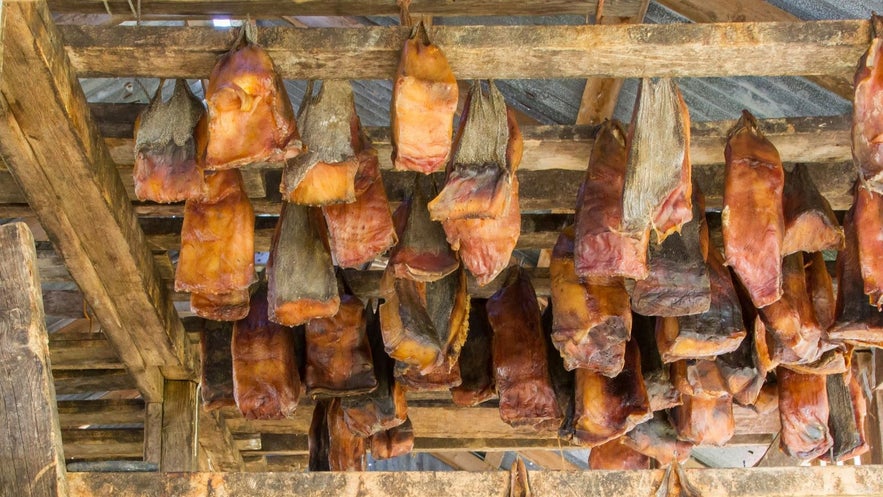 One of the best things to do when visiting a new country is to try the local food. When it comes to historic Icelandic food, however, not all dishes are equally enticing. The most infamous Icelandic dish is probably the Hakarl, or fermented shark, which is somewhat of a test of bravery for visitors.
One of the best things to do when visiting a new country is to try the local food. When it comes to historic Icelandic food, however, not all dishes are equally enticing. The most infamous Icelandic dish is probably the Hakarl, or fermented shark, which is somewhat of a test of bravery for visitors.
This is why you shouldn't miss out on a visit to the Bjarnarhofn Shark Museum. It's a must-stop on the Snaefellsnes peninsula for anyone interested in Icelandic culture. You'll learn about shark fishing in Iceland through the centuries and its cultural significance. You'll see how the dish is prepared, and you'll get to try it out for yourself!
Afterward, you can enjoy a delicious meal at their on-site café, making it a great addition to your travel itinerary.
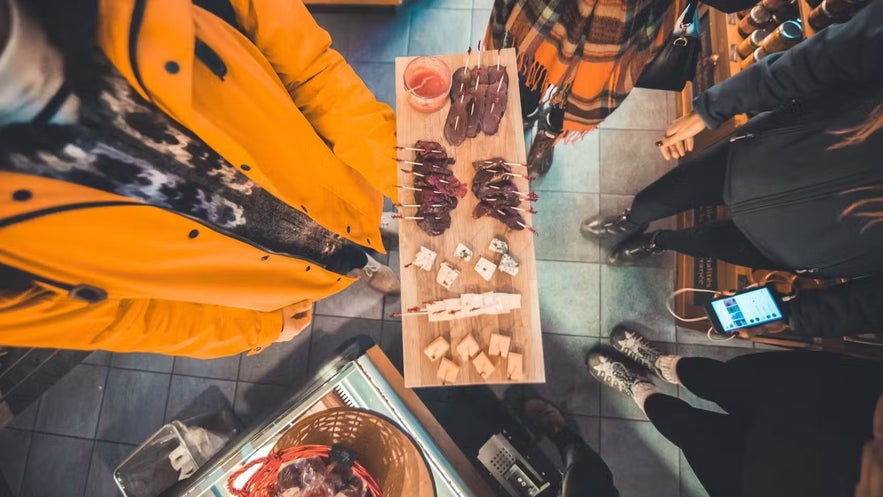
Photo from Reykjavik Food Walk Tour
If you don't want to try fermented shark, you can still enjoy a fantastic food experience on the Snaefellsnes peninsula. You can go on this magical 2-hour seafood boat cruise from Stykkisholmur, where you'll get to explore the beautiful Breidafjordur bay while enjoying the freshest possible seafood in Iceland!
Alternatively, if you don't have time to fit either of these experiences into your travel itinerary, we recommend trying fermented shark and other dishes as part of a food walking tour in Reykjavik. You'll get to know more about modern and traditional Icelandic food with the help of an informative guide. A great option for this experience is this highly-rated Reykjavik food walk tour, where you'll get to try a variety of traditional food along with delicious modern dishes in some of Reykjavik's best restaurants!
- Read more: The Ultimate Guide to Iceland Food Culture
- See also: The Best Restaurants in Reykjavik
2. Explore the Snaefellsjokull Glacier
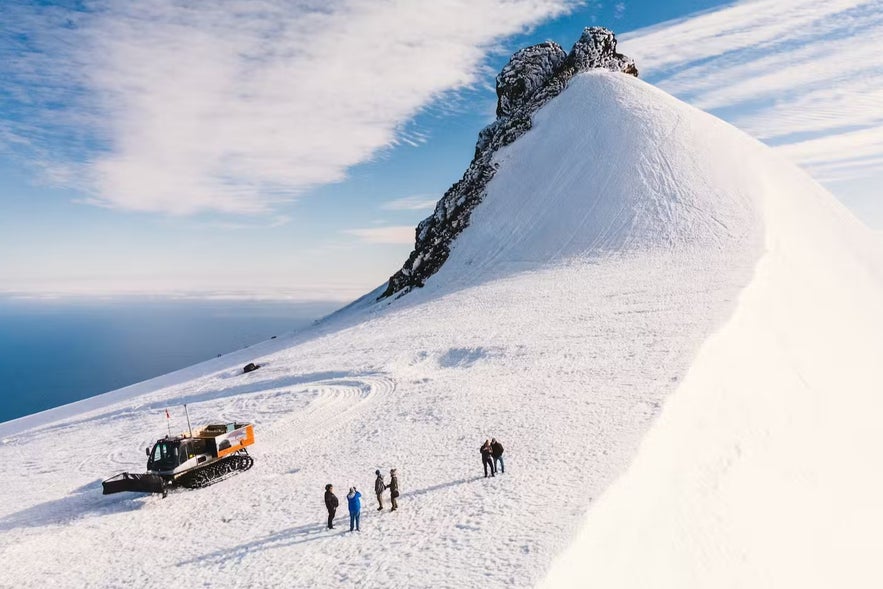
Photo from Snowcat Tour on Snaefellsjokull Glacier
The crowning jewel of the Snaefellsnes peninsula is the dramatic Snaefellsjokull glacier volcano which towers over the surrounding landscape. There are many hiking trails in the area that will bring you to the roots of the glacier, but you should never try to go on the ice itself without a qualified guide!
This makes a Snaefellsjokull tour one of the best things to do in the region. During summer, you can go on this glacier hiking tour on Snaefellsjokull, where you'll be provided with glacier hiking equipment and accompanied by an expert guide. You'll see beautiful views of the surrounding nature as you ascend to the top. In total, the experience takes around six to seven hours.
The hike is suitable for most as it isn't very challenging, but if you prefer to skip the hike, you can add to the thrill with this Snaefellsjokull glacier snowcat tour! The snowcat vehicle will easily bring you to the top, where you can admire the setting of Jules Verne's book "Journey to the Center of the Earth."
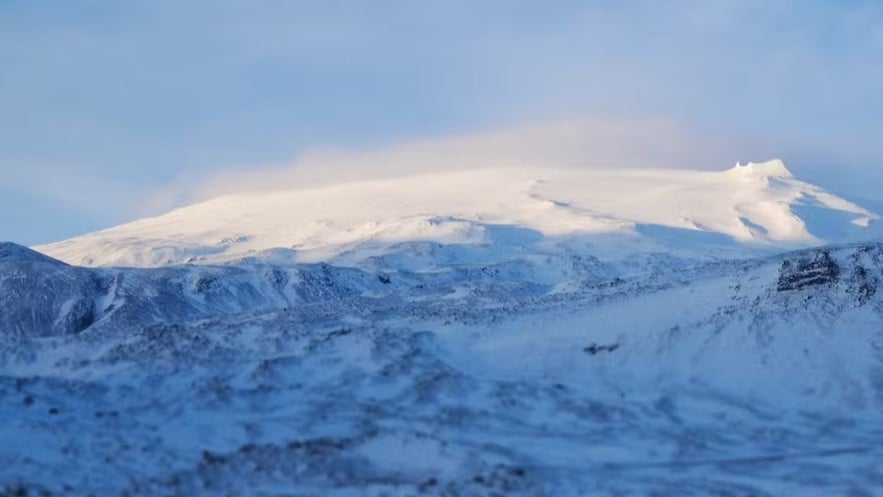
Photo from Glacier Hiking Tour on Snaefellsjokull
While on the top, you may even have a unique experience. Some talk about feeling very strong energy surrounding the Snaefellsjokull glacier volcano, and it's considered to be one of the biggest and strongest energy fields in the world by those in tune with such things. Aliens were even predicted to land on top of the glacier on November 5th, 1993, at 21:03, and hundreds of people gathered to welcome them in an effort that, unsurprisingly, turned out to be fruitless.
It is little wonder as to why they were attracted to the idyllic cone shape of the volcano, which can be admired all the way from Reykjavik on clear days, a distance of 75 miles (120 kilometers). All of these factors have contributed to the Snaefellsjokull glacier volcano becoming one of the most famous attractions in Iceland in the past years and a must-visit destination.
1. Puffin Tours and Whale Watching on the Breidafjordur Bay
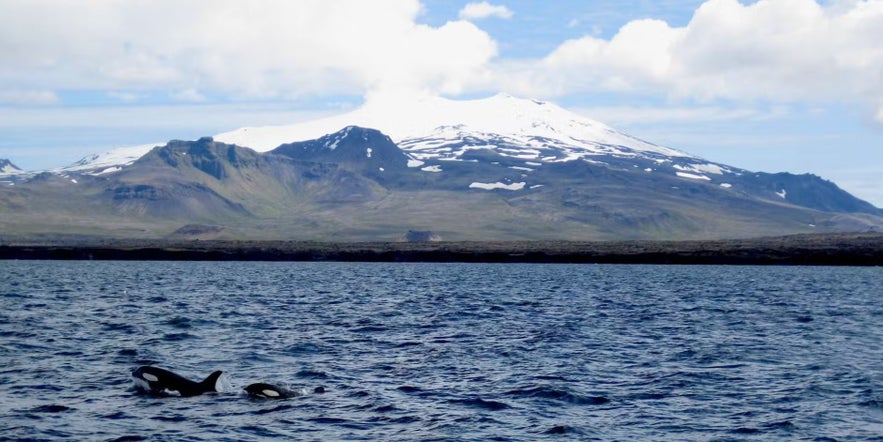
Photo from Breidafjordur Bay Whale Watching Tour with Transfer from Olafsvik in Snaefellsnes Peninsula
One of the best things to do in Iceland is to go on a whale-watching tour, which you can do off the Snaefellsnes peninsula coast! This whale-watching tour on the Breidafjordur bay departs from the small town of Olafsvik and brings you closer to the gentle giants of the sea.
This region offers great chances for spotting orcas and sperm whales, but you may also see minke whales, harbor porpoises, white-beaked dolphins, or even humpback whales! With knowledgeable guides on board, you'll learn about the whales’ behaviors, conservation efforts, and the rich biodiversity of the area.
The Breidafjordur area is brimming with birdlife, and during summer, you can sometimes spot puffins nesting in the cliffsides! You may be able to see them from a distance during a whale-watching tour, but if you want a closer look at these adorable birds, you can take this puffin-watching tour from Stykkisholmur.
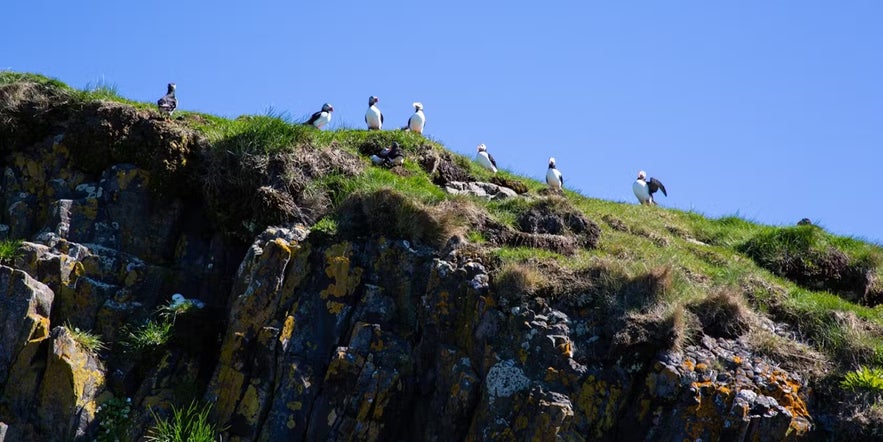
Photo from Puffin Watching Tour on Breidafjordur Bay, Stykkisholmur
The tour brings you to Ellidaey, one of the many picturesque islands on the Breidafjordur bay where you'll get a great look at the nesting puffins. Afterward, you will get a chance to do some seal spotting as well!
Sailing around Breidafjordur bay will provide stunning views of the surrounding mountains, and you'll be able to see some of the bay's many islands. It's an easy addition to your Snaefellsnes peninsula travel itinerary that's sure to be a memorable experience.
- Learn more with the Best Guide to Whale Watching in Iceland
- See also: Birds in Iceland
Top 5 Towns to Visit on the Snaefellsnes Peninsula
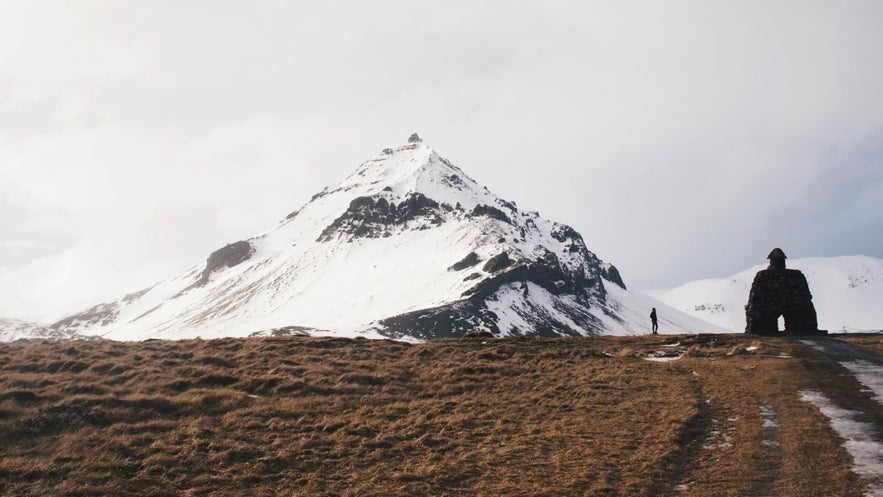 As you travel through the region, you'll pass through some lovely towns and villages that are worth a stop. This is also where you'll find the best accommodations in Snaefellsnes if you're planning to spend more than a day in the area. The village of Arnarstapi already has a special mention on this list, so here are more towns you must include on your travel itinerary of the Snaefellsnes peninsula.
As you travel through the region, you'll pass through some lovely towns and villages that are worth a stop. This is also where you'll find the best accommodations in Snaefellsnes if you're planning to spend more than a day in the area. The village of Arnarstapi already has a special mention on this list, so here are more towns you must include on your travel itinerary of the Snaefellsnes peninsula.
5. Hellnar
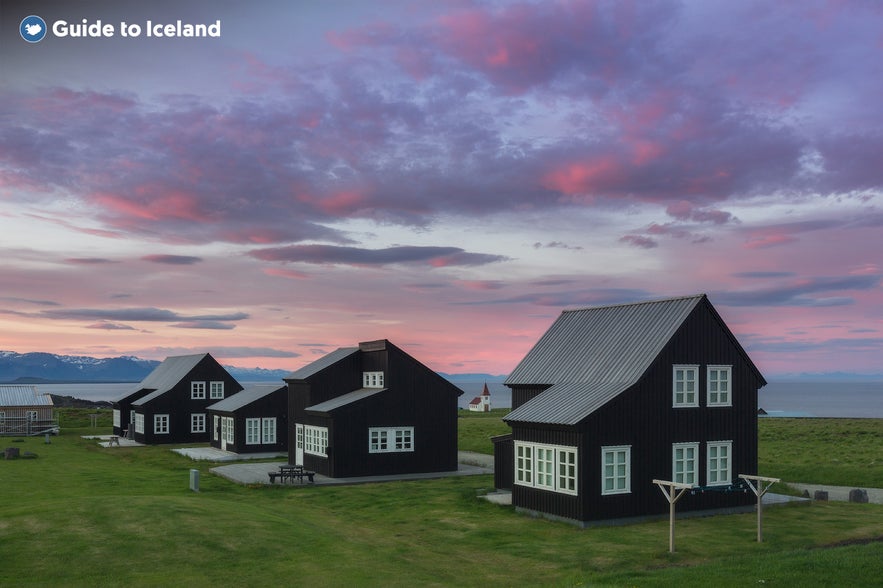 Hellnar is a small hamlet on the southern coast of the Snaefellsnes peninsula that's just a 10-minute drive away from the Malarrif Visitor Center. It's known for its seaside cliffs and the Badstofa cave, which has unique lighting. It's a great place for beautiful photographs.
Hellnar is a small hamlet on the southern coast of the Snaefellsnes peninsula that's just a 10-minute drive away from the Malarrif Visitor Center. It's known for its seaside cliffs and the Badstofa cave, which has unique lighting. It's a great place for beautiful photographs.
There are multiple hiking paths in the vicinity, and we recommend walking along the coast to the village of Arnarstapi. It will take around an hour one way, and you'll have beautiful views of lush lava fields, the rugged coast, and the Snaefellsjokull glacier.
Once you return, you can enjoy a cup of coffee or a meal at the Fjoruhusid café. It's only open in summer, but it has amazing views over the ocean.
Where to Stay in Hellnar
If you're spending multiple days in the region, you can spend a night in Hellnar. It's conveniently located along the edge of the Snaefellsnes peninsula, and it's close to the Snaefellsjokull National Park.
A good option for your stay in the town is the Fosshotel Hellnar, which has an average rating of 4.5 out of 5 stars from over 290 guests. You can choose from varied room types to suit different needs and budgets. This is a popular location, especially in summer, so make sure to book your stay in advance.
4. Hellissandur
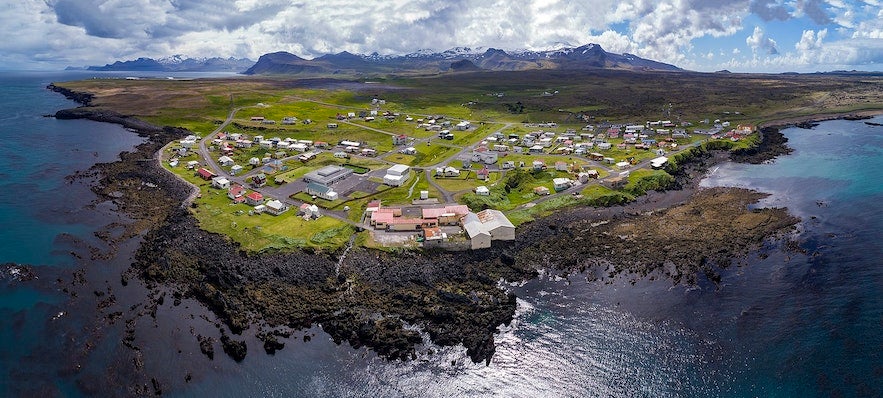
Photo above from Wikimedia, Creative Commons, by Chensiyuan. No edits made.
The small village of Hellissandur sits near the tip of the Snaefellsnes peninsula and is just next to the Snaefellsjokull National Park. It's conveniently located close to some of the region's major attractions, like Mt. Kirkjufell, which is just a 30-minute drive away.
You can enjoy a charming art walk around the village, as you'll find many colorful and interesting murals featured on the walls of different buildings in the "Street Art Capital of Iceland." If you're visiting in summer, you can treat yourself to a delicious meal at the local restaurants.
If you're planning a thorough exploration of the Snaefellsjokull National Park, it's very convinient to stay in Hellissandur. It's also where you'll find one of the two service centers for the park.
Where to Stay in Hellissandur
You can stay in accommodation in Hellissandur if you want to experience all that this town, and its beautiful surroundings, have to offer. For a comfortable stay, you can book a night at the Freezer Apartments. You'll enjoy complete privacy in a studio apartment with views over the ocean. It's a great retreat into nature, in a convinient location.
3. Grundarfjordur
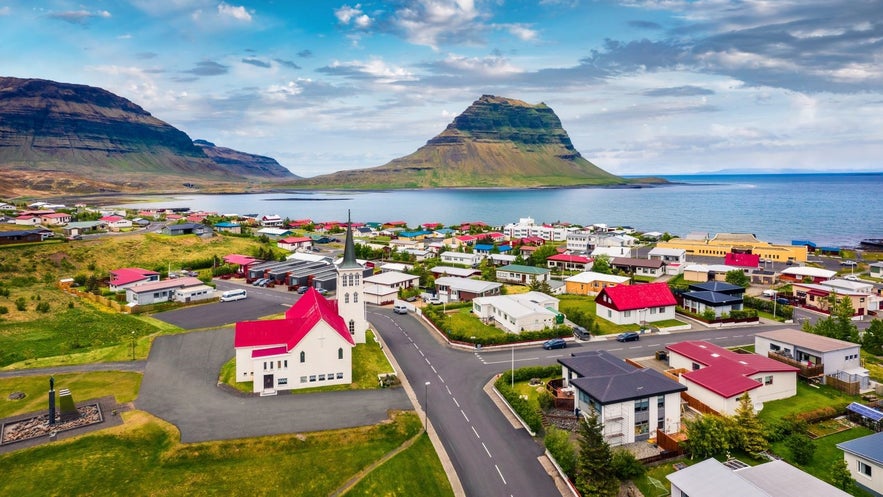 Grundafjordur is one of the larger towns on the Snaefellsnes peninsula. You'll find restaurants, a lovely church, an interesting historical center, and a peaceful swimming pool. There's a 9-hole golf course in the town, and you can even try your hand at frisbee golf!
Grundafjordur is one of the larger towns on the Snaefellsnes peninsula. You'll find restaurants, a lovely church, an interesting historical center, and a peaceful swimming pool. There's a 9-hole golf course in the town, and you can even try your hand at frisbee golf!
It's also the location of the famous Kirkjufell mountain, which sits on the edge of the Grundafjordur fjord. You'll have great views of the mountain from most places in the town.
Where to stay in Grundafjordur
If you want to stay close to the Kirkjufell mountain, then it's best to find accommodation in Grundafjordur. You can book a night at the Old Post Office Guesthouse, which has lovely views of the surrounding mountains. It has an average rating of 4.3 out of 5 stars from over 120 guests.
You'll enjoy comfortable rooms with a private bathroom, with the benefit of access to a shared kitchen. Its convinient location makes it a good base for exploring the surrounding attractions.
2. Olafsvik
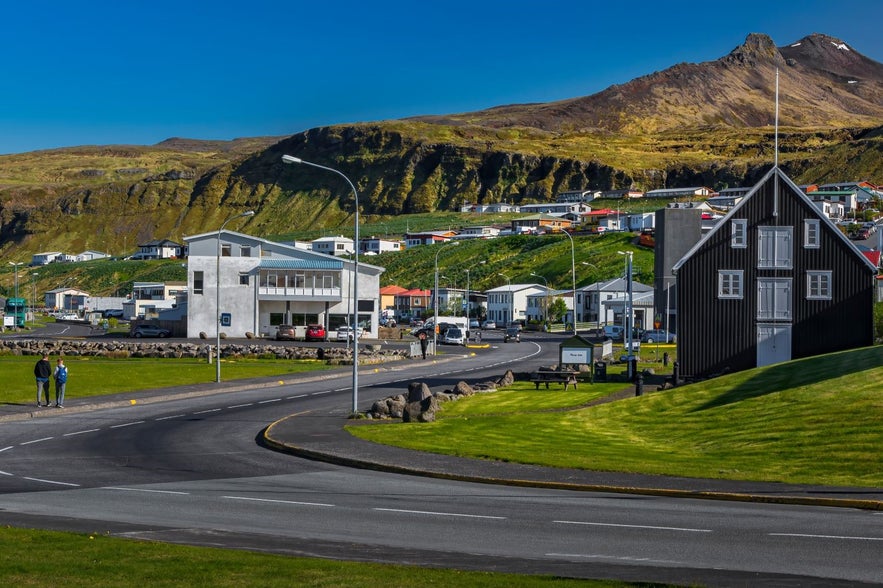 The charming town of Olafsvik is a good base for exploring the Snaefellsnes peninsula. It has a lively harbor where you can go whale watching. There's also a very charming museum in the town center known as Pakkhusid. In the vicinity, you'll also find cozy restaurants, a nice swimming pool, and a convinient grocery store.
The charming town of Olafsvik is a good base for exploring the Snaefellsnes peninsula. It has a lively harbor where you can go whale watching. There's also a very charming museum in the town center known as Pakkhusid. In the vicinity, you'll also find cozy restaurants, a nice swimming pool, and a convinient grocery store.
Olafsvik has a modern church that sits above a painted rainbow street framed by a picturesque mountainside. If you're looking for a cute photo opportunity, you'll also find a sign by the church that instructs visitors to share a kiss!
Close by, you can enjoy a walk to a beautiful waterfall, which also offers great views of the surrounding area. There's also a lovely memorial garden dedicated to sailors who have lost their lives at sea.
Where to Stay in Olafsvik
This peaceful town makes for a good base when spending multiple days on the Snaefellsnes peninsula. Choose from different accommodation options in Olafsvik and enjoy a comfortable stay. The most unique place to stay is the Freezer Hostel, which is actually a 7-minute drive outside Olafsvik. Over 370 guests have given their experience an average rating of 4.4 out of 5 stars.
Not only is it a hostel, but also a theatre and a music venue, focusing on bringing live arts to the surrounding community. Local and international bands and solo artists have also performed here, so there's always something interesting going on. This hostel is also well worth a visit, even if you decide to stay elsewhere!
If you prefer to stay in the center of Olafsvik, you can stay at the North Star Hotel Snaefellsnes. Alternatively, you can rent one of the Welcome Apartments Olafsvik for a home-away-from-home.
1. Stykkisholmur
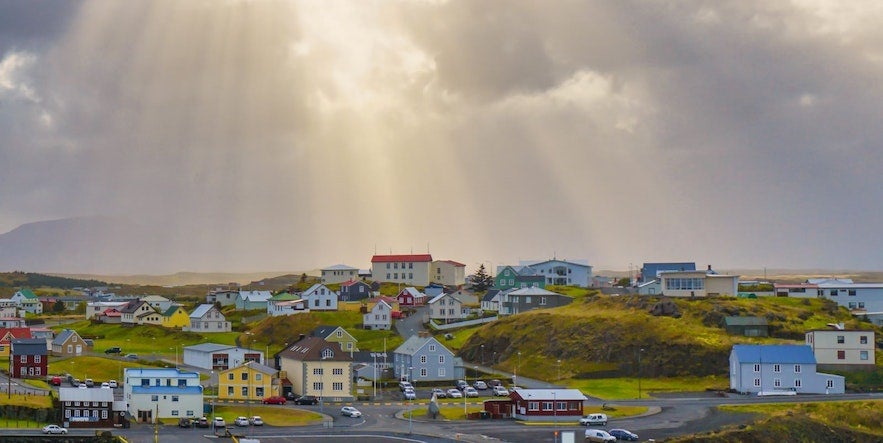
Stykkisholmur is the largest town on the Snaefellsnes peninsula, and it's known for its colorful traditional houses and beautiful harbor. You may also have seen Stykkisholmur featured in the film The Secret Life of Walter Mitty, where it was used as the setting for Nuuk in Greenland.
You can find multiple grocery stores, local shops, restaurants, cafés, bakeries, and other services in Stykkisholmur. There are also cultural attractions like the historic Norwegian House and the Library of Water exhibition. The local swimming pool also has a fun waterslide!
You'll find a number of boat trips operating from Stykkisholmur to the wide Breidafjordur fjord, including different tours and the ferry Baldur that crosses to the Westfjords with a stop at the tranquil Flatey island.
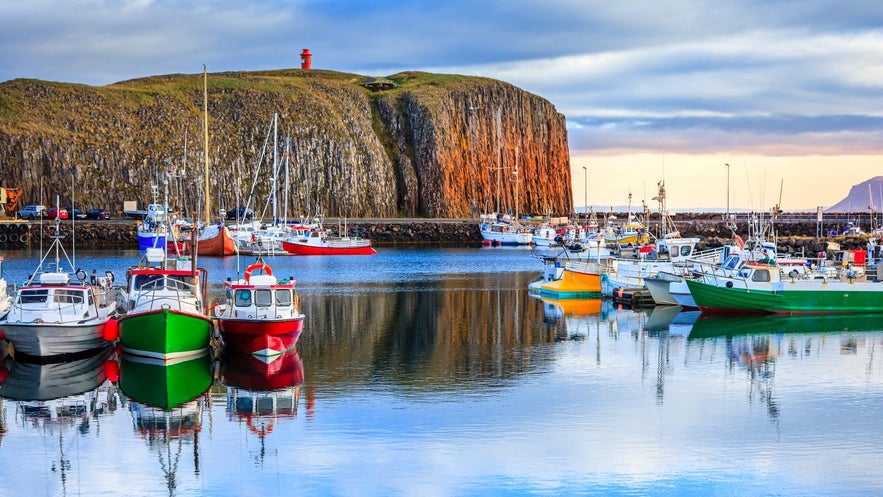 The harbor is framed by the beautiful Sugandisey island, which you can easily access on foot. Take the time to walk around it and take in the great views of the surrounding bay. You can also visit a tiny lighthouse that sits at the very top of the island.
The harbor is framed by the beautiful Sugandisey island, which you can easily access on foot. Take the time to walk around it and take in the great views of the surrounding bay. You can also visit a tiny lighthouse that sits at the very top of the island.
Stykkisholmur has a lot to offer and is worth spending a day exploring. It's also the best place to stay for multiple days on the Snaefellsnes peninsula.
Where to Stay in Stykkisholmur
As the largest town on the Snaefellsnes peninsula, you'll have varied options for accommodations in Stykkisholmur. There is a campsite in town, as well as a few hostels, homestays, rental apartments, and hotels.
One of the most charming places to stay in Stykkisholmur is the Hotel Egilsen. You'll be staying in a historic red building close to the harbor, with easy access to surrounding attractions. It has an average rating of 4.6 out of 5 stars from over 100 visitors.
Another option is the Fosshotel Stykkisholmur, which is probably the largest hotel in town. It has an average rating of 4.2 out of 5 stars from over 450 guests and offers comfortable and modern rooms.
- See more about Stykkisholmur and the Trip back to Reykjavik
Summary of the Top Things to Do on the Snaefellsnes Peninsula
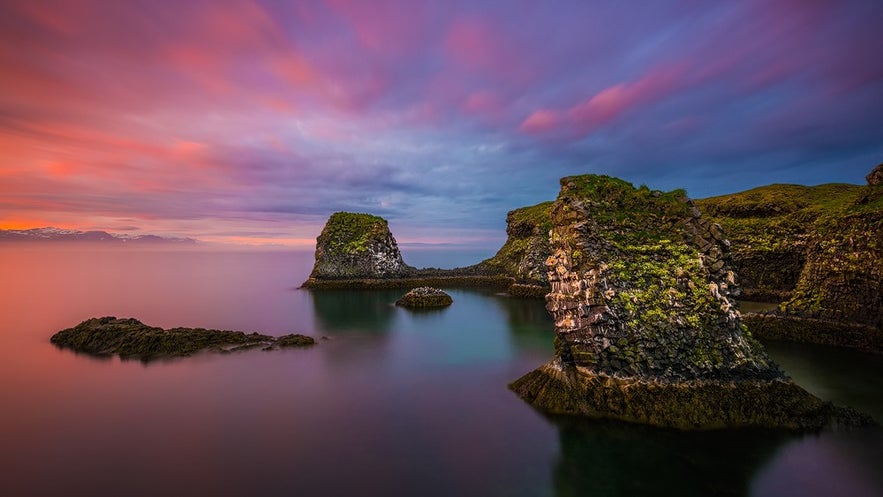 The Snaefellsnes peninsula is one of the most beautiful and varied regions in Iceland. From the iconic Snaefellsjokull glacier and volcano to rugged coastlines, black sand beaches, and charming villages, it encapsulates the essence of Iceland’s natural beauty.
The Snaefellsnes peninsula is one of the most beautiful and varied regions in Iceland. From the iconic Snaefellsjokull glacier and volcano to rugged coastlines, black sand beaches, and charming villages, it encapsulates the essence of Iceland’s natural beauty.
It's the perfect day tour from Reykjavik, but it will take multiple days to discover all the hidden treasures of the region. Plan a visit during your trip to Iceland and experience all that "Iceland in Miniature" has to offer!
Which of these locations would you love to visit? Will you do a Snaefellsnes day tour or enjoy multiple days in the region? Is there anything missing from our list? Share your thoughts in the comments below!
Other interesting articles
Top 9 Most Famous Icelanders in History
Which famous Icelander had the biggest impact on culture and history? Read ahead, to learn of the adventurous Icelandic Vikings, incredible writers, and trail-blazing Icelandic men and women who cam...Read more
The Top 10 Geothermal Spas in Iceland
What is a geothermal spa? Where are the best geothermal spas in Iceland? What is the difference between a geothermal spa and a hot pool? Continue reading to learn about the ten best places to unwind...Read more
Driving in Iceland in March: The Ultimate Guide
March is a great time to explore Icelandic nature with a rental car. As winter transforms into spring, the days are getting longer while the dark nights offer a chance of seeing the northern lights. P...Read more

Download Iceland’s biggest travel marketplace to your phone to manage your entire trip in one place
Scan this QR code with your phone camera and press the link that appears to add Iceland’s biggest travel marketplace into your pocket. Enter your phone number or email address to receive an SMS or email with the download link.

